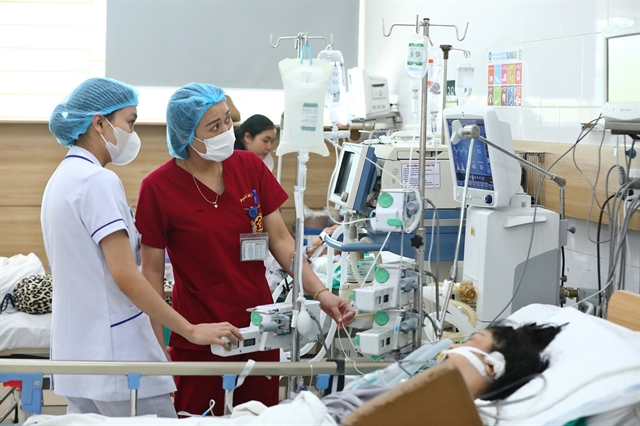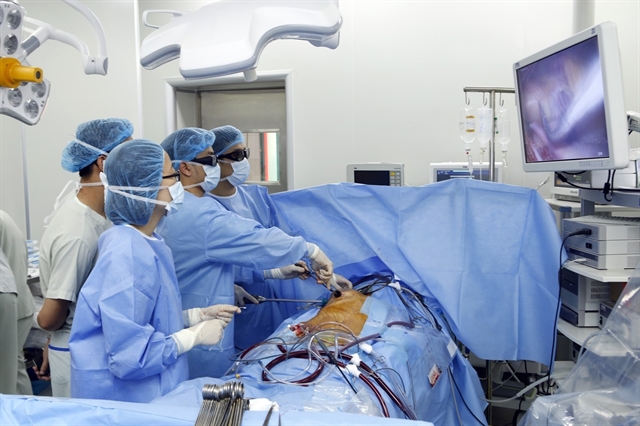 Society
Society

 |
| Doctors care for a severely poisoned patient undergoing treatment at the Poison Control Center of Bạch Mai Hospital. VNS/VNS Photo Minh Quyết |
HÀ NỘI – Leaders of central hospitals have voiced their concerns over the draft amended Law on the Capital that would transfer the management of central hospitals from the Ministry of Health to Hà Nội.
They argue that such a move would negatively impact the quality of healthcare services for patients and the professional development of the medical teams at these hospitals. Many said that the Ministry of Health should continue managing the central hospitals as they currently do.
Trần Cao Bình, director of the Hà Nội Central Hospital of Odonto-Stomatology pointed out that the hospitals under the ministry in Hà Nội were all specialised and leading institutions, serving as the final level of medical care with international influence and connections.
They developed specialised techniques on par with other countries in the region and the world.
"We not only provide medical care but also carry out the task of training and directing local hospitals. We update the world's advanced techniques before transferring them to lower-level hospitals. If the management is transferred to Hà Nội, how will the development of specialisation for lower-level hospitals be handled?" he said.
Đào Xuân Cơ, director of Bạch Mai Hospital, highlighted the current lack of emergency and intensive care units in the southwest and central highlands regions.
Without specialised hospitals and guidelines from central hospitals, lower-level hospitals would find it hard to ensure quality healthcare.
Cơ mentioned that in most developed countries around the world, there were numerous private hospitals, but the Government still directly managed 20-30 per cent of public hospitals to fulfil social welfare tasks.
He said he had received requests for specialised and leading hospitals to continue being managed by the Ministry of Health to ensure consistent guidance from the central level.
Regarding Bạch Mai Hospital, Cơ explained: "Besides medical treatment and guidance to lower-level hospitals, we are actively cooperating internationally to learn, apply, and deploy advanced techniques from around the world to Việt Nam.”
“We are currently implementing the task assigned by the Ministry of Health to build a comprehensive list of economic and technical indicators. With the support of relevant departments of the Ministry of Health, we have already established more than 5,000 indicators. How will this be accomplished if we are under Hà Nội's management?", he said.
Nguyễn Công Hựu, director of E Hospital and Vũ Nam, director of Central Traditional Medicine Hospital agreed, saying that their hospitals were currently directing several district and provincial-level hospitals.
If they came under Hà Nội's management, this would significantly impact their work of providing guidance, they said.
The role of central hospitals managed by the Ministry of Health in training healthcare personnel was also another problem.
 |
| Doctors directly observe a minimally invasive heart surgery using 3D technology at the Cardiovascular Center of E Hospital. VNA/VNS Photo Dương Ngọc |
Việt Nam-Germany Friendship Hospital, Bạch Mai Hospital, Central Pediatrics Hospital, Cancer Hospital, the National Otorhinolaryngology Hospital, and E Hospital have been used as practical training facilities for medical staff in Hà Nội and neighbouring areas.
"Currently, E Hospital is a practical training base for Hà Nội Medical University and the University of Medicine and Pharmacy under the National University of Hà Nội. If we are under Hà Nội's management, will this work be affected?" he said.
In a previous meeting at the Ministry of Health on July 31, Hựu said more than 1,300 medical staff at E Hospital expressed their wish to continue being managed by the Ministry of Health.
Dr Trần Sĩ Tuấn, Editor-in-chief of Sức khoẻ & Đời sống (Health & Life) newspaper said that transferring hospital management was impulsive and unbeneficial, which might cause a wave of doctors to quit their jobs.
Tuấn said the Cancer Hospital, Việt Nam- Germany Friendship Hospital or Bạch Mai Hospital were renowned for having highly skilled teams of doctors and specialists, serving 10 million residents of Hà Nội and tens of millions of people from northern and central provinces.
Bringing these leading hospitals under Hà Nội's administration would limit their scope of operations. As a result, patients will suffer.
Patients from other provinces might be sent back to their local hospitals as Hà Nội-based hospitals were already overloaded. This could lead to cases where patients might die prematurely due to a lack of timely medical attention.
Central hospitals also have the responsibility of transferring expertise, providing guidance, and supporting hospitals at grass-root levels. When transferring these leading hospitals to Hà Nội's administration, this important role could be compromised as the Ministry of Health will need to obtain the city's consent to continue this job.
This would significantly impact the healthcare services for ethnic minorities and those in remote areas.
These leading hospitals are also places of practical training for medical universities. Professors and doctors from universities are involved in leading hospital departments. Moreover, these professors and doctors from the universities are high-quality staff for the hospitals.
If these hospitals come under Hà Nội's management, this collaboration might be disrupted, significantly affecting the training of doctors and the hospitals' operations, he stressed. – VNS




